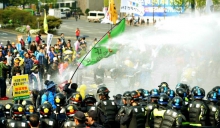International Workers' Day - 1 May 2015

In the last year, millions of people around the world have demonstrated against austerity, for better wages and against secret trade deals that will end democracy and hard-won rights. In an attempt to suppress nation-wide protests against an economic model that works for the 1%, protests are being criminalized and heavy fines are handed down to those who dare to stand up.
Workers' right to freedom of association by forming trade unions is set out in the Universal Declaration of Human Rights and the International Covenant on Civil and Political Rights. And in the context of freedom of association, the right of workers to strike is specifically stated in the International Covenant on Economic, Social and Cultural Rights. ILO Convention 87 forms part of customary international human rights law. Nevertheless, while the right to strike is being restricted, employers’ organizations go as far as claiming the right to lock-out which has no international legal foundation whatsoever.
During the last 20 years the share of wages in total income has decreased in 70% of countries, despite the increase in the level of employment worldwide. The share of well paid, secure jobs is shrinking on a daily basis and whereas employment in the public sector used to be well-protected and stable, more than 50% of public sector workers are now in precarious work. Most of these lowest paid and least protected jobs are held by women.
Instead of creating decent jobs with living wages, the current economic model looks for full-blown exploitation with minimum wages, zero-hour contracts and young workers working for free for months. Minimum wages for young workers as low as 60% of the general minimum wage are another perverse response to soaring youth unemployment. In many countries the situation of workers is even more desperate with no access to formal employment, no investments in public services and growing insecurity. Hundreds of people have died in the Mediterranean Sea in the last weeks, while fleeing from chaos and destruction.
Rosa Pavanelli, PSI General Secretary, says: “The Post 2015 Development Agenda and Global Social Development goals have to be based on equity and human rights instead of promoting privatization and the unbridled commercialization of all public goods. A sustainable future is built on democracy and decent work, not on the interests of the few.”
Instead of turning to PPPs, governments should ensure that public funding is available for the provision of universal quality public services. PSI works with the Global Alliance for Tax Justice, calling for governments to commit to widespread progressive tax reforms, and for a Ministerial Roundtable on tax cooperation to be held as part of the United Nations Financing for Development conference in Addis Ababa, Ethiopea, in July. Further, an inclusive intergovernmental body on tax matters should be established under the UN where all countries have an equal seat at the table.
PSI, EPSU and Global Alliance for Tax Justice have also published a Joint Statement for 1 May.

